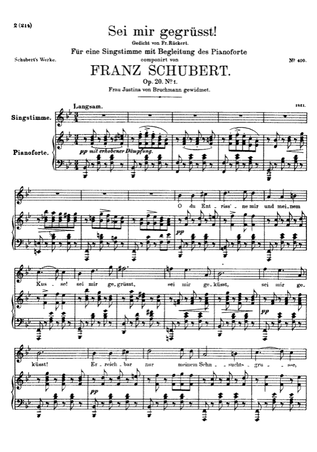Notes & Stories |
Franz Schubert Fantasie in C Major, D.934 for Violin and Piano |
|
Franz Schubert’s C Major Fantasie for Violin and Piano has a simple musical premise, but, emotionally and technically speaking, a rather complex realization. The piece is in four parts, and approximates the basic landscape of a four-movement sonata (slow-fast-slow-fast), played without breaks. The third section, marked Andantino, contains the germ and crux of the piece: a set of variations on a tune from a song Schubert wrote in 1821, entitled, simply Sei mir gegrüsst ("I greet you" or, more literally—in a way that doesn't nicely translate to English—"Be greeted from me"). The song alone contains far more than its modest title indicates: the ‘du’ is someone who has been taken away, and can no longer be greeted and kissed. If the song is not heard as a bit silly or frothy (which is entirely possible, and not at all un-Viennese), it can come across as quite a difficult fantasy in its own right, especially seen in the context of Schubert's short and rather unhappy biography, or in any other context where contact has been made difficult.
|
In the Fantasie, Schubert causes a simple rising line (on which the tune of ‘Sei mir gegrüsst’ is based) to emerge very gradually. It appears first in a psychedelic sort of opening (Andante Molto), played by the violin over hazy tremolos in the piano. This little rising line appears again in the second and fourth movements, and of course it appears fully in the third movement, where the song itself is the musical subject. But in a way, the ‘rising line’ idea is so simple that it doesn’t even count as a motive- it is not developed as systematically as the motive of a sonata would be. Instead, it is (as advertised) a near-formless source for musical fantasy with an upward-leaning melodic habit.
More practically speaking, it is important to acknowledge the sheer virtuosity of the Fantasie, for both instruments. This music is crammed with notes. Moreover, the piece asks for a very particular, and very demanding, sort of virtuosity: fantastic elements in both violin and piano usually have very specific effects and tight relationships with one another, and Schubert uses virtuosity quite carefully to outline the architectural elements. Only occasionally does the virtuosity seem simply celebratory or merely decorative. But when it does finally open up, it is a welcome development—for the performer, the listeners, and even, possibly, the narrator of ‘Sei mir gegrüsst’. Welcome as a fantasy, at least.
© Timothy Summers
|
Sei mir gegrüsst
Friedrich Rückert O du Entriss’ne mir und meinem Küsse! Sei mir gegrüsst! Sei mir geküsst! Erreichbar nur meinem Sehnsuchtsgrusse! Sei mir gegrüsst! Sei mir geküsst! Du von der Hand der Liebe diesem Herzen Gegeb’ne! du Von dieser Brust Genomm’ne mir! mit diesem Tränengases Sei mir gegrüsst! Sei mir geküsst! Zum Trotz der Ferne, die sich, feindlich trennend, Hat zwischen mich Und dich gestellt; Dem Neid der Schicksalsmächte zum Verdrusse Sei mir gegrüsst! Sei mir geküsst! Wie du mir je im schönsten Lenz der Liebe Mit Gruss und Kuss Entgegen kamst, Mit meiner Seele glühendstem Ergüsse, Sei mir gegrüsst! Sei mir geküsst! Ein Hauch der Liebe tilget Räum’ und Zeiten, Ich bin bei dir, Du bist bei mir, Ich halte dich in dieses Arms Umschlusse, Sei mir gegrüsst! Sei mir geküsst! |
I greet you
English Translation © Richard Wigmore You who were torn from me and my kisses, I greet you! I kiss you! You, whom only my yearning greeting can reach, I greet you! I kiss you! You who were bestowed on this heart by the hand of love, you who were taken from my breast! With this flood of tears I greet you! I kiss you! Defying the distance that, hostile and divisive, has come between you and me; frustrating the envious powers of fate, I greet you! I kiss you! As in love’s fairest spring you once came to me with greetings and kisses, so with all the fervour of my soul I greet you! I kiss you! One breath of love dissolves time and space, and I am with you, you are with me; I hold you closely in my arms’ embrace, I greet you! I kiss you! Translation by Richard Wigmore first published by Gollancz and reprinted in the Hyperion Schubert Song Edition |
